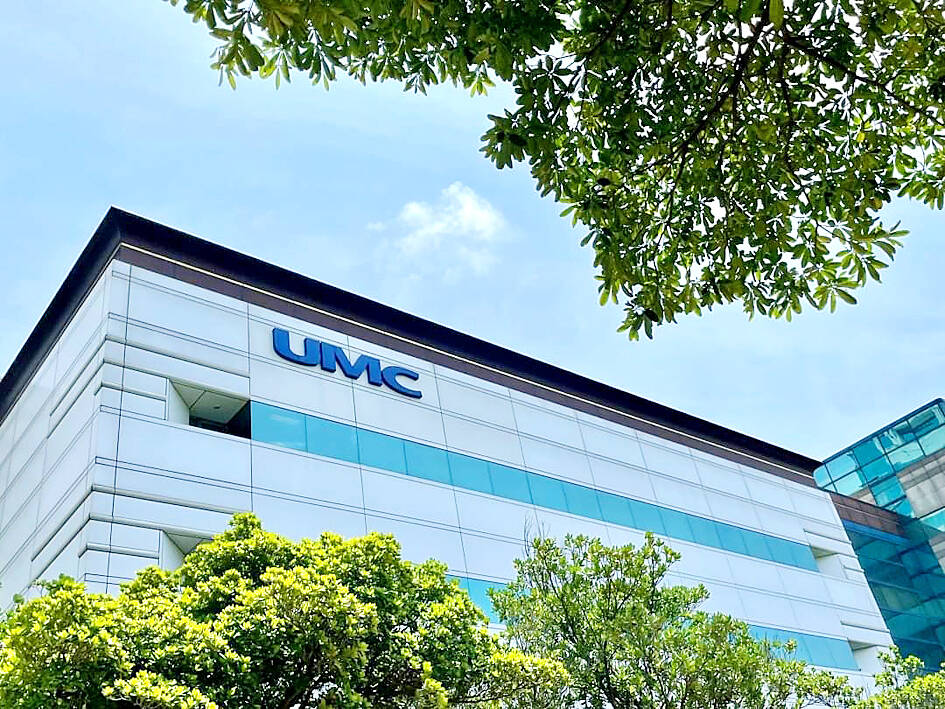United Microelectronics Corp (UMC, 聯電) expects its addressable market to grow by a low single-digit percentage this year, lower than the overall foundry industry’s 15 percent expansion and the global semiconductor industry’s 10 percent growth, the contract chipmaker said yesterday after reporting the worst profit in four-and-a-half years in the fourth quarter of last year.
Growth would be fueled by demand for artificial intelligence (AI) servers, a moderate recovery in consumer electronics and an increase in semiconductor content, UMC said.
“UMC’s goal is to outgrow our addressable market while maintaining our structural profitability,” UMC copresident Jason Wang (王石) told an online earnings conference.

Photo: Grace Hung, Taipei Times
For the current quarter, UMC expects wafer shipments to be flat from last quarter.
“The first quarter is better than traditional seasonality,” Wang said. “It could be triggered by either the [US] tariffs or the subsidies [on consumption by Beijing]. We are hoping that the second quarter can sustain that [momentum], but at this point, due to limited visibility, we cannot give you a second-quarter guidance.”
Gross margin is expected to drop to below 30 percent but above 25 percent this quarter, compared with 30.4 percent last quarter, attributable to a 5 percent decline in average selling prices and higher depreciation expenses, UMC said.
That also factored in the impact of a magnitude 6.4 earthquake that hit Chiayi County yesterday.
The factory utilization rate is to be little changed versus last quarter at 70 percent, it said.
To fend off growing competition, UMC is looking to strengthen its product portfolio and boost revenue contribution from 22-nanometer and 28-nanometer chips, the most advanced chips available from UMC, to 37 or 38 percent this year, from 34 percent last year, Wang said.
UMC is also committed to collaborating with Intel Corp in developing 12-nanometer technology, Wang said.
In addition, UMC is broadening its advanced chip packaging product offerings beyond the 2.5-D interposer that is used in chip-on-wafer-on-substrate technology, Wang said.
The chipmaker would not miss out on business opportunities associated with new photonic ICs, he said.
UMC plans to allocate 38 percent less capital expenditure this year at US$1.8 billion, compared with US$2.9 billion last year.
Net profit plummeted 35.6 percent year-on-year to NT$8.5 billion (US$259.4 million) last quarter. That represented a quarterly contraction of 41.4 percent from NT$14.47 billion in the third quarter last year.
Last year as a whole, UMC’s net profit shrank 22.6 percent to NT$47.21 billion compared with NT$60.99 billion in 2023. Earnings per share fell to NT$3.8 from NT$4.93.

Anna Bhobho, a 31-year-old housewife from rural Zimbabwe, was once a silent observer in her home, excluded from financial and family decisionmaking in the deeply patriarchal society. Today, she is a driver of change in her village, thanks to an electric tricycle she owns. In many parts of rural sub-Saharan Africa, women have long been excluded from mainstream economic activities such as operating public transportation. However, three-wheelers powered by green energy are reversing that trend, offering financial opportunities and a newfound sense of importance. “My husband now looks up to me to take care of a large chunk of expenses,

SECTOR LEADER: TSMC can increase capacity by as much as 20 percent or more in the advanced node part of the foundry market by 2030, an analyst said Taiwan Semiconductor Manufacturing Co (TSMC, 台積電) is expected to lead its peers in the advanced 2-nanometer process technology, despite competition from Samsung Electronics Co and Intel Corp, TrendForce Corp analyst Joanne Chiao (喬安) said. TSMC’s sophisticated products and its large production scale are expected to allow the company to continue dominating the global 2-nanometer process market this year, Chiao said. The world’s largest contract chipmaker is scheduled to begin mass production of chips made on the 2-nanometer process in its Hsinchu fab in the second half of this year. It would also hold a ceremony on Monday next week to

TECH CLUSTER: The US company’s new office is in the Shalun Smart Green Energy Science City, a new AI industry base and cybersecurity hub in southern Taiwan US chip designer Advanced Micro Devices Inc (AMD) yesterday launched an office in Tainan’s Gueiren District (歸仁), marking a significant milestone in the development of southern Taiwan’s artificial intelligence (AI) industry, the Tainan City Government said in a statement. AMD Taiwan general manager Vincent Chern (陳民皓) presided over the opening ceremony for the company’s new office at the Shalun Smart Green Energy Science City (沙崙智慧綠能科學城), a new AI industry base and cybersecurity hub in southern Taiwan. Facilities in the new office include an information processing center, and a research and development (R&D) center, the Tainan Economic Development Bureau said. The Ministry

State-run CPC Corp, Taiwan (CPC, 台灣中油) yesterday signed a letter of intent with Alaska Gasline Development Corp (AGDC), expressing an interest to buy liquefied natural gas (LNG) and invest in the latter’s Alaska LNG project, the Ministry of Economic Affairs said in a statement. Under the agreement, CPC is to participate in the project’s upstream gas investment to secure stable energy resources for Taiwan, the ministry said. The Alaska LNG project is jointly promoted by AGDC and major developer Glenfarne Group LLC, as Alaska plans to export up to 20 million tonnes of LNG annually from 2031. It involves constructing an 1,290km